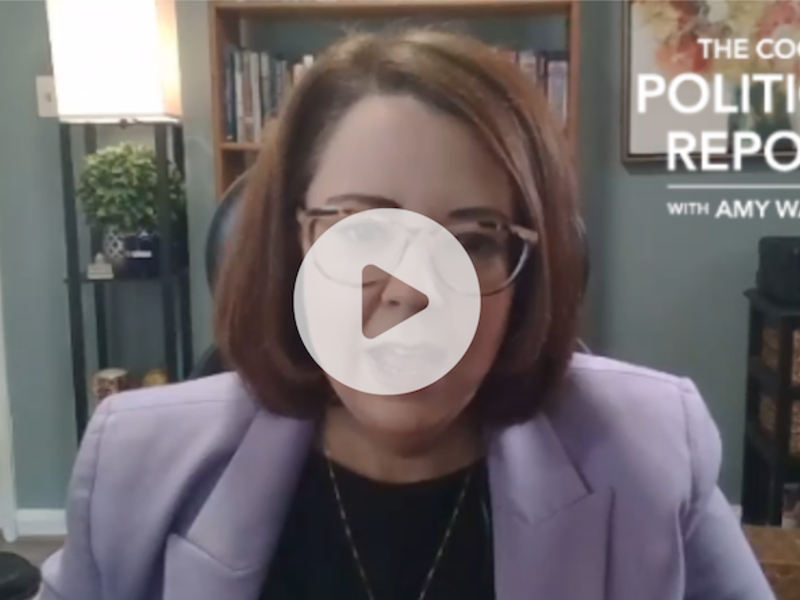
Elizabeth Warren has captured the attention of Democratic primary voters. But, can she convince them that she's the one who can beat President Trump?
This is Elizabeth Warren's week. The latest RealClearPolitics national average puts her in third place — just three points behind Sen. Bernie Sanders. And, in Iowa, she's jumped to a tie for second with Sanders and South Bend Mayor Pete Buttigieg. This week alone she's gotten glowing profiles in the New Yorker, the New York Times, and American Prospect. This is a big improvement from earlier this spring when the conventional wisdom was that her candidacy was in free fall. Even President Trump counted her out, telling Fox News in late March that "I hit her too hard, too early, and now it looks like she's finished."
The consensus explanation for her rise from the ashes is that her embrace of policy and substance and her 'grind-it-out' attitude is paying off. But, there are several other reasons for her rehabilitation.
- Her biggest liability — the controversy over her decision to take a DNA test to prove her Cherokee ancestry — is no longer part of the daily political conversation.
- The more that Sanders leans into democratic socialism, the more Warren is able to position herself as a more 'palatable' disruptor; one who wants to expand government, but who also calls herself a capitalist.
- Finally, in a party where more than 55 percent of the electorate is female, it was only a matter of time before a woman broke into the top-tier.
The question now is if her rise will continue. Here's what I will be looking for:
1. Will she be able to translate her rising poll numbers into better fundraising?
Her first-quarter filing was anemic (she raised just $6M), with the bulk of her haul coming from a $10M transfer from her Senate campaign coffers. Will she translate this new publicity boon into a fundraising bonanza? And, how will it compare with the fundraising from another Democratic candidate who has been on the rise since Q1; Pete Buttigieg? Also, will her decision to eschew big-dollar fundraisers and rely on small, online contributions limit her ability to stay even with folks like Buttigieg, Harris and Biden?
2. Can she make the case she can beat Trump?
By now the 'electability' question has become a well-worn cliché of the 2020 Democratic primary. But, while it is a cliché, it also remains a top concern among Democratic primary voters. Polls show this to be a top concern in Iowa, New Hampshire, and Nevada. It's also a top concern among Democrats in national polls. A late April Ipsos/Reuters poll (4/17-23) found that 63 percent of Democrats named "can beat President Trump in the general election" as their top one or two factors in deciding who to vote for in the primary contest. Coming in a distant second—at 33 percent— was health care, followed closely by "can unify the Democratic party" at 30 percent. In that same poll, 46 percent of Democrats picked Biden as the candidate who was the best on the 'beat Donald Trump' issue. No one else even made it into the double digits.
The CBS/YouGov Battleground Survey that was released this past weekend asked Democratic voters in Iowa, New Hampshire, and South Carolina to name all the candidates they were 'considering' voting for in the 2020 primary/caucus. It then asked them to rate that candidate's chances of beating President Trump. Biden dominated this question in every state. Even in New Hampshire, Warren's backyard, just 40 percent of Democratic voters said that she would 'probably win' a race against Trump, versus 69 percent who said that about Biden. Another 49 percent put her chances at beating Trump at "maybe," compared to 29 percent who said that about Biden.
3. What's the matter with New Hampshire?
If there is a state where Warren should have some early traction, it should be New Hampshire. Many in New England see southern New Hampshire as the Boston exurbs. But, Warren did little to take advantage of that proximity in her re-election campaign last year. As my colleague Jennifer Duffy has pointed out, Warren ran an incredibly flinty campaign and ran no general election ads in the Boston TV market that would reach voters in the state. It also explains why she had $10M in her Senate coffers to give to her presidential campaign.
There hasn't been a lot of polling in the state, but the most recent (and reliable) Monmouth Poll (5/2-7) not only had Warren significantly trailing Biden and Sanders, but she was also not as personally popular as those two candidates. While Biden and Sanders are only slightly better known than Warren, they are better liked. Biden's favorable ratings were 80 percent to 15 percent unfavorable (+65), Sanders was at 73 percent favorable to 19 percent unfavorable (+54), but Warren was at just 63 percent favorable and 24 percent unfavorable (+39).
As she gains in standing and stature nationally, will her popularity in the state also rise? The good news for Warren is that she's looking much stronger in Iowa today than she was back in March, a sign that her ceiling is expandable.
4. Will Trump turn his twitter taunts back to Warren?
The President's "Pocahontas" label wasn't just effective in demonizing Warren among Republicans, it also drove a wedge with Democrats who worried that Trump could effectively caricature Warren the way he did with his "Crooked Hillary" taunts. Now that Warren is back on the rise—and cutting into Trump's populist messaging—I'd expect to see the attacks on her return.
Image credit: AP Photo/John Minchillo










Subscribe Today
Our subscribers have first access to individual race pages for each House, Senate and Governors race, which will include race ratings (each race is rated on a seven-point scale) and a narrative analysis pertaining to that race.